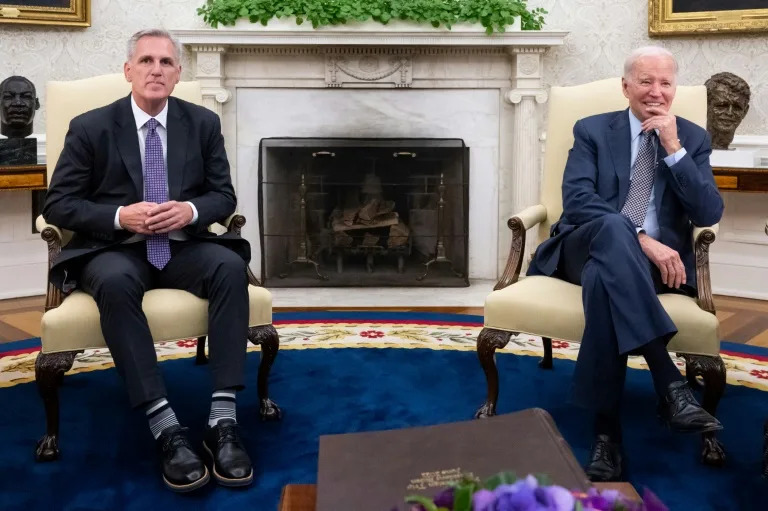
US President Joe Biden (right) and US House Speaker Kevin McCarthy
WASHINGTON, May 28 (NNN-AGENCIES) — The top Republican leader said, after marathon talks, that he and the White House had agreed to a draft deal on raising the US debt ceiling and said Congress will vote on Wednesday – just days before the country disastrous default.
“After weeks of negotiations we have come to an agreement in principle,” Speaker Kevin McCarthy said in a statement from the House of Representatives.
McCarthy, who spoke with Biden on Saturday to try to close the deal, said he would consult again with the president Sunday and oversee final drafting of the Bill. The House will “then be voting on it on Wednesday”.
Biden said in a statement that the draft Bill would stop a “catastrophic default and would have led to an economic recession, retirement accounts devastated, and millions of jobs lost.”
Raising the debt ceiling – a legal manoeuvre that takes place most years without drama – allows the government to keep borrowing money and remain solvent. The Treasury estimated that it would run out of money on June 5.
Saturday’s breakthrough promises a chance to drag the world’s biggest economy back from the edge of its first default in history, a calamity that would likely trigger stock market panic, mass job losses and recession.
However, McCarthy cautioned there was “still a lot of work to do”.
The biggest challenge will be persuading the hard-right members of his party to accept a Bill falling well short of their original attempt to force Biden into accepting huge spending cuts on social programs as a condition for allowing the debt ceiling to be raised.
The Democrats, meanwhile, may face a rebellion on the left of the party, which objects to any spending cuts at all.
Biden himself had long insisted on a “clean” debt ceiling raise, with no linkage to the political tussles over spending. He then climbed down from that position to find a compromise deal.
According to US media reports, the outline of the deal includes freeing up the debt ceiling for two years, meaning there will be no need for negotiations in 2024, when the nation is in full presidential election swing.
Rather than the deep spending cuts Republicans had wanted as an antidote to the country’s huge US$31 trillion debt, there will effectively be a budget freeze, as well as tougher rules on accessing unemployment benefits and other federal assistance.
Treasury Secretary Janet Yellen had initially warned of a possible default on June 1 if Congress failed to raise the ceiling on borrowing, but gave lawmakers some breathing room on Friday when she updated the estimate to June 5.
Even so, the legislation will still have to clear Congress much more quickly than the normal timetable for even the most uncontroversial bills.
Under House rules, lawmakers have to be given 72 hours before voting once a Bill is presented. And if it passes the House, it will then have to go through the Senate, where Democrats hold the majority.
McCarthy is hoping to bring the narrow House majority of 222 Republicans with him, but the deal is likely to face opposition from 35 far-right lawmakers who told him to “hold the line” against compromising on far more sweeping spending cuts. That means a large number of Democrats will have to be persuaded to vote with a reduced number of Republicans – something that rarely happens on big Bills.
Congress was adjourned for an extended holiday weekend but lawmakers will be called back to vote.
If a default occurs, the government would not miss loan repayments until mid-June but in the meantime it would likely have to halt US$25 billion in social security checks and federal salaries.
The battle has been monitored closely by the major ratings agencies, with Morningstar and Fitch both warning that they could opt for a downgrade, even if crisis is averted.
When Barack Obama’s administration narrowly averted a default 12 years ago, a ratings downgrade cost taxpayers more than US$1 billion in higher interest costs. — NNN-AGENCIES




